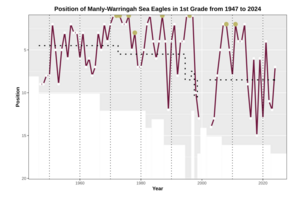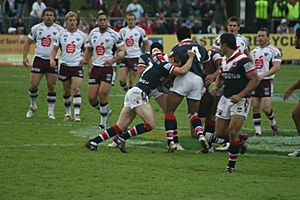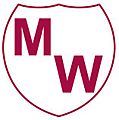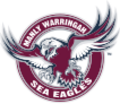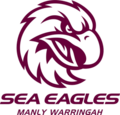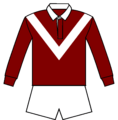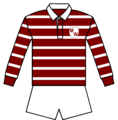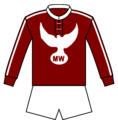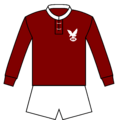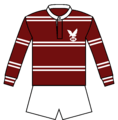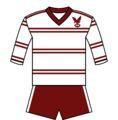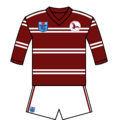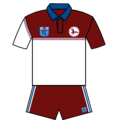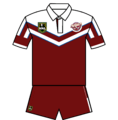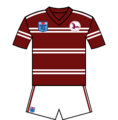Manly Warringah Sea Eagles facts for kids
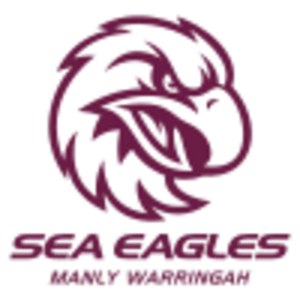 |
|||
| Club information | |||
|---|---|---|---|
| Full name | Manly Warringah Sea Eagles Rugby League Football Club | ||
| Nickname(s) | Silvertails | ||
| Website | seaeagles.com.au | ||
| Colours |
|
||
| Founded | 4 November 1946 | ||
| Exited | 1999 (merged with North Sydney Bears as Northern Eagles) |
||
| Readmitted | 2003 | ||
| details | |||
| Ground(s) |
|
||
| CEO | Tony Mestrov | ||
| Chairman | Scott Penn | ||
| Coach | Anthony Seibold | ||
| Manager | Peter Gentle | ||
| Captain | Daly Cherry-Evans | ||
| Competition | National Rugby League | ||
| 2024 season | 7th | ||
| Uniforms | |||
|
|||
| Records | |||
| Premierships | 8 (1972, 1973, 1976, 1978, 1987, 1996, 2008, 2011) | ||
| Runners-up | 11 (1951, 1957, 1959, 1968, 1970, 1982, 1983, 1995, 1997, 2007, 2013) | ||
| Minor premiership | 9 (1971, 1972, 1973, 1976, 1983, 1987, 1995, 1996, 1997) | ||
| World Club Challenge | 1 (2009) | ||
| Wooden spoons | 0 | ||
| Most capped | 345 - Daly Cherry-Evans | ||
| Highest points scorer | 1917 - Graham Eadie | ||
The Manly Warringah Sea Eagles is a professional rugby league club from Sydney, Australia. They play in the top competition, the National Rugby League (NRL). The club started playing in 1947 and plays most of its home games at Brookvale Oval. Their training happens at the New South Wales Academy of Sport in Narrabeen. The team's colours are maroon and white, and they are often called Manly.
The club played in the NSWRL, ARL, or NRL competitions every season from 1947 until 1999. In 1999, they joined with the North Sydney Bears to form the Northern Eagles. This new team played in 2000 and 2001. The partnership ended, and Manly Warringah returned to their original name in 2003.
Manly won their first championship in 1972. Since then, they have won seven more titles, with their most recent win in 2011. The club has appeared in 19 Grand Finals since 1951.
Contents
- The History of the Sea Eagles
- The Northern Eagles Era
- Returning to Glory
- The 2007 Season
- The 2008 Season: A Grand Final Win
- The 2009 Season
- The 2010 Season
- The 2011 Season: Another Championship
- The 2012 Season
- The 2013 Season
- The 2014 Season
- The 2015 Season
- The 2016 Season
- The 2017 Season
- The 2018 Season
- The 2019 Season
- The 2020 Season
- The 2021 Season
- The 2022 Season
- The 2023 Season
- The 2024 Season
- 2025 Ladder
- Team Emblem and Colours
- Manly Leagues Club
- Home Stadium: Brookvale Oval
- Club Facilities
- Local Player Development
- Team Players
- Team Rivalries
- Head-to-Head Records
- Team Coaches
- Team Records and Statistics
- Club Honours
- Famous Supporters
- Manly Seabirds
- See also
The History of the Sea Eagles
By the mid-1940s, rugby league was growing in Sydney. In 1946, Manly Warringah won the Presidents Cup Grand Final, which helped them join the NSWRL competition.
The NSWRL accepted Manly's application on November 4, 1946. They had tried twice before in 1937 and 1944. Manly and Parramatta were allowed to join the 1947 competition. Even though North Sydney might have lost players, they supported Manly joining. They believed it would help rugby league become more popular in the area.
Many players from North Sydney, including 20 Manly juniors, moved to the new team in its first season. North Sydney struggled in 1947 and for the next four seasons.
Manly chose maroon and white as their colours, which they had used for their Presidents Cup team. They picked the sea eagle as their emblem, a bird of prey found on the Sydney coastline. Even though some media called them "sea gulls," the club has always been officially known as the Sea Eagles.
Manly's first game was against Western Suburbs at Brookvale Oval on April 12, 1947. Max Whitehead, who had played for Norths, was Manly's first captain. Their first win was against the Parramatta Eels. The club finished their first season in second-last place.
Manly first played in a Grand Final in 1951 but lost to South Sydney. They played in five Grand Finals before winning their first championship in 1972. They won again in 1973, 1976, and 1978. The 1973 final against Cronulla was known as one of the toughest Grand Finals ever.
Manly was strong in the early 1980s but lost two Grand Finals in a row to Parramatta in 1982 and 1983. Their next championship was in 1987 against the Canberra Raiders. This was the last Grand Final played at the Sydney Cricket Ground. Coached by Bob Fulton, the Sea Eagles made the play-offs in 1993 and 1994 but lost to the Brisbane Broncos both times.
In 1988, Manly played against the touring Great Britain Lions and won 30-0 at Brookvale Oval. This was impressive because Manly was missing six regular players. Teenage halfback Geoff Toovey was named man of the match.
In 1995, Manly had a very strong season but lost to Canterbury in the Grand Final. Even though they were the best attacking team, they couldn't score a try in the final.
In 1996, Manly reached another Grand Final and beat St. George to win the title. In 1997, Australian rugby league was split into two leagues, ARL and Super League. Manly was a top team in the ARL. For the third year in a row, Manly reached the Grand Final. However, they lost to the Newcastle Knights right at the end of the game.
The Manly teams from 1995 to 1997 played exciting football and had a very strong defence. Many great players were part of these teams, including Des Hasler, Geoff Toovey, Steve Menzies, Terry Hill, and Cliff Lyons. After 1997, the club's performance declined, and they missed the finals in 1999.
The Northern Eagles Era
Manly Warringah joined with the North Sydney Bears to become the Northern Eagles from 2000 to 2002. This happened during a time when the NRL was reorganizing. The team played home games at both Brookvale Oval and Central Coast Stadium.
The Northern Eagles did not have much success, finishing 12th, 10th, and 9th. They won 30 out of 76 games. Playing games in Gosford instead of North Sydney Oval made some North Sydney fans unhappy. The partnership ended in 2002, and Manly returned as a stand-alone club. The 2002 season was played under the Northern Eagles name, but it was effectively the Manly-Warringah Sea Eagles.
Returning to Glory
After the joint venture ended, Manly kept the Northern Eagles license for the 2002 season. They officially returned as the Manly Warringah Sea Eagles for the 2003 season. The 2003 and 2004 seasons were tough for the team. However, they improved their players for 2005 and reached the semi-finals for the first time since 1998. Manly then made the finals every year until 2015.
During this time, Manly introduced many players who became stars. These included local players like Jason King and Anthony Watmough, as well as brothers Glenn Stewart and Brett from Wollongong.
The 2007 Season
Manly finished the 2007 regular season in 2nd place, losing only six matches. They were the only team close to Melbourne for the minor premiership. After beating North Queensland, Manly played in their 15th Grand Final against Melbourne. They lost 34–8. Melbourne later had their 2007 title taken away due to breaking rules about player payments.
The 2008 Season: A Grand Final Win
Many wondered if Manly could be as good in 2008 after losing a key player. They lost their first two games. However, Manly finished the regular season tied for first place with Melbourne and Cronulla, but were 2nd based on points.
In the qualifying final, Manly played St. George at Brookvale. This was club legend Steve Menzies' last game at Brookvale, and he scored the first try. After a week off, Manly faced the New Zealand Warriors. Manly beat the Warriors 32–6, showing their strong defence and attacking skills. With this win, Manly reached their 17th Grand Final, where they played the Melbourne Storm again.
The 2008 Grand Final was very different. Manly beat Melbourne 40–0, which was the largest winning margin in a Grand Final in rugby league history. Michael Monaghan's replacement, Matt Ballin, scored the first try. Winger Michael Robertson scored three tries, and retiring legend Steve Menzies scored a try near the end. Manly player Brent Kite won the Clive Churchill Medal for being the best player in the Grand Final.
The 2009 Season
Before the 2009 season, Manly travelled to England to play the Leeds Rhinos in the 2009 World Club Challenge. Manly won the World Club Challenge 28–20.
The 2009 season started poorly for Manly. They lost their first four games, becoming the first defending champions since Melbourne in 2000 to do so. They finally won 23–10 against the Tigers, with Brett Stewart scoring three tries. Stewart then got a serious knee injury and only played five games in 2009. The Sea Eagles finished fifth and lost their first play-off game to Melbourne. This championship was also later taken away from the Storm.
The 2010 Season
In 2010, Manly-Warringah started with many new players, including young playmaker Kieran Foran. They lost their first two games but then won their third. Injuries and player suspensions caused them to drop down the ladder. They finished 8th and just made the finals. If Melbourne had not been penalized for breaking rules earlier in the season, Manly would have missed the finals.
Manly went into their final game with many key players injured or suspended. Their season ended with a 28–0 loss to the eventual champions, St. George Illawarra.
The 2011 Season: Another Championship
At the end of the 2010 season, Manly Warringah lost some players. Daly Cherry-Evans joined the first-grade team. Manly had not signed any big-name players for 2011. They finished 8th, their lowest position since 2005.
Manly's 2011 season began with a loss to the Melbourne Storm. However, they then had an upset 27–16 win over the Sydney Roosters, even without several key players. This was followed by a 26–12 win over the Newcastle Knights.
Despite losing many players, the Sea Eagles finished second on the NRL Ladder at the end of the regular season, behind the Melbourne Storm. They won all their home games at Brookvale Oval, which was again called "Brookie Fortress." The final game at Brookvale was a top-of-the-table clash against the Melbourne Storm. Manly won 18–4, but the game was remembered for a fight between Glenn Stewart and Adam Blair, earning it the nickname 'The Battle of Brookvale'.
In their first play-off game, Manly-Warringah won 42–8 against the North Queensland Cowboys. They then defeated the Brisbane Broncos 26–14 to reach the 2011 NRL Grand Final. They played the New Zealand Warriors, who were hoping for their first championship.
Manly-Warringah won their eighth championship, beating the New Zealand Warriors 24–10 in the Grand Final. Glenn Stewart won the Clive Churchill Medal for his great performance. He and his brother Brett Stewart were the first brothers to score tries in the same Grand Final. Manly's second championship in four years made them one of the most successful teams of the 21st century.
Six weeks after their win, head coach Des Hasler was dismissed. Geoff Toovey immediately became the new head coach for the 2012 season.
The 2012 Season
Manly Warringah's pre-season started with a big loss to Cronulla. They also lost to Leeds Rhinos in the 2012 World Club Challenge.
The Sea Eagles' championship defence began with a 26–20 win against the New Zealand Warriors. They then had another close win against the Wests Tigers. Manly lost their first game of 2012 to the Cronulla-Sutherland Sharks and then to St. George Illawarra.
Manly-Warringah finished the 2012 regular season in 4th place. They were defeated by the Bulldogs in the first week of the finals but then beat the North Queensland Cowboys. However, their season ended the next week when they lost to the eventual champions, Melbourne Storm.
The 2013 Season
Manly spent much of the 2013 season quietly, staying in the top four. Many thought the team, with its older players and injuries, would struggle. However, they seemed to play better when faced with bigger challenges.
They finally beat a top-four team with a 28–8 win over Melbourne in Round 25. Despite injuries and other challenges, they grew stronger as the season went on. They just missed out on the Grand Final, losing to the Sydney Roosters 26–18.
The 2014 Season
Most of the news about Manly in 2014 was about players leaving. Popular player Glenn Stewart joined Souths in 2015 because the club couldn't afford to keep him.
For a team that had been so successful, finishing in the second week of the finals was seen as a disappointment. They lost their top spot late in the season, had key players injured, and were knocked out of the finals quickly. Even though they finished in the top two, it was not a satisfactory result.
The 2015 Season
Manly struggled in 2015, not reaching their usual high standards. They had made the finals every year for a decade, so missing the top eight was a big change.
The club faced a tough season with player contract issues, the coach Geoff Toovey being dismissed, and many injuries. The team tried hard to make the finals late in the season but couldn't quite do it.
2015 was a year of big changes for Manly, as their period of dominance ended. They lost key players like Anthony Watmough and Glenn Stewart. They also lost Kieran Foran and coach Geoff Toovey. However, Manly had a strong second half of the season and finished 9th, just missing the finals after being in last place earlier.
To help the club, Bob Fulton returned as a "consultant." He helped recruit new players for 2016, such as Nate Myles, Dylan Walker, Lewis Brown, and Martin Taupau. Fulton also convinced Daly Cherry-Evans to stay with the club. New young players like Jake Trbojevic and Tom Trbojevic also showed great promise.
The 2016 Season
After Geoff Toovey was dismissed, Manly signed former player Trent Barrett as coach for his first year. The team lost some key players like Kieran Foran and Matt Ballin.
In the first nine rounds of the 2016 NRL season, Manly continued to have injury problems with several important players. This forced the coach to use different lineups. Despite this, they showed signs of becoming a top team again, eventually finishing 13th with eight wins.
On April 27, long-serving captain Jamie Lyon announced he would retire at the end of the 2016 season. Lyon was a key player in their 2008 and 2011 championship teams.
The 2017 Season
After a difficult 2016 Manly Warringah Sea Eagles season, the Sea Eagles finished 6th and made it to the 2017 NRL Finals Series. However, they lost in the first week to Penrith. At the end of season awards, Daly Cherry-Evans won the Roy and Bull award for best and fairest player.
The 2018 Season
After the first two rounds, Manly was found to have broken some rules about player payments over the previous five years. They received a fine and a reduction in their salary cap for 2018 and 2019.
The NRL's own auditors had previously approved all payments to Manly players. However, the definition of finding "third party payments" was changed.
At the end of the 2018 season, Manly finished 15th after a tough year. There were also rumours of disagreements with coach Barrett. In October 2018, it was announced that two-time championship-winning coach Des Hasler would return to Manly.
The 2019 Season
Before the 2019 NRL season, many thought Manly would struggle. However, they surprised many by staying in the top 8 for most of the season. This included beating Melbourne at AAMI Park and Canberra twice. Manly-Warringah qualified for the finals, finishing 6th.
Manly reached the second week of the finals but were defeated by South Sydney 34–26.
The 2020 Season
Manly-Warringah started the 2020 NRL season well, winning four of their first six games. However, a serious injury to star player Tom Trbojevic affected their season. Manly won only three of their last fourteen games and finished 13th, missing the finals.
The 2021 Season
Manly did not start the 2021 NRL season well, losing their first four games. The match against Penrith, which they lost 46–6 at Brookvale Oval, was their biggest home defeat ever.
However, their season improved greatly. By round 16, Manly had their biggest win in club history, beating Canterbury 66–0. After the regular rounds, Manly finished in the top 4, in 4th place.
The top try scorers for Manly were Tom Trbojevic with 25 tries, Jason Saab with 23 tries, and Reuben Garrick with 21 tries. Reuben Garrick became the first player in rugby league to score over 300 points in a regular season. He was also the first to score 20 tries and 100 goals in a championship season.
After losing to Melbourne in the first week of the finals, the club won in week two, defeating the Sydney Roosters 42–6. In the preliminary final, they lost to South Sydney 36–16, missing out on the Grand Final.
The 2022 Season
Manly-Warringah started the 2022 NRL season by losing their first two games before winning their next four. Another serious injury to star player Tom Trbojevic in round 11 affected their season again. Manly won only four of their last thirteen games and finished 11th, missing the finals. Their season was also marked by a disagreement about team jerseys, which led to some players not playing in a round 20 match. On October 13, the club decided to end Des Hasler's time as head coach.
The 2023 Season
Under new head coach Anthony Seibold, the club started strongly with four wins and one draw from their first seven games, placing them 4th. However, from round 8 to round 20, Manly only won three games. They recorded four wins from their remaining seven matches, finishing in a disappointing 12th place.
The 2024 Season
In the 2024 NRL season, Manly finished 7th and made it to the finals. The club defeated Canterbury in week one of the finals. However, their season ended the following week when they were defeated by the Sydney Roosters.
2025 Ladder
| Pos | Team | Pld | W | D | L | B | PF | PA | PD | Pts |
|---|
Team Emblem and Colours
- Manly Warringah Sea Eagles – Logos
The team has always been officially known as the "Manly Warringah Sea Eagles" since 1947.
When they joined the NSWRL, Manly chose maroon and white as their colours. They picked the sea eagle as their emblem, a bird of prey found on the Sydney coastline. The club's first jersey was maroon with a large white 'V'. The 'Sea Eagle' has been on all jerseys since the mid-1950s. Many versions of the sea eagle logo have appeared over the years. From the 1980s, Manly used one of their most famous logos during their most successful years.
In 1998, with the new National Rugby League competition, Manly changed their logo. It featured maroon, white, yellow, and blue, linking to their main sponsor at the time, Pepsi. This logo didn't last long because of the merger with North Sydney Bears in 2000, which created the Northern Eagles.
When Manly returned in 2003, they went back to a similar logo, updated to focus on the sea eagle and include "Warringah" in the name. They also returned to their original colours, but with a darker shade of maroon and white, showing their roots from 1947.
In October 2023, Manly revealed a new, modern logo that also honoured the club's history. The new logo kept the traditional maroon and white colours and parts of past Manly emblems, like a circular shape used since 1978. It focused on the sea eagle head with simpler details.
Team Jerseys
- Manly Warringah Sea Eagles – Jerseys
Manly Leagues Club
Manly Warringah Rugby Leagues Club (known as Manly Leagues) is a leading club on Sydney's northern beaches. The Leagues Club also took over Dee Why Bowling Club in 2022.
Manly Leagues has always supported the Manly Warringah Sea Eagles. The club's goal includes supporting rugby league in the local area, and the Sea Eagles' success shows how well this support works.
Home Stadium: Brookvale Oval
When Manly Warringah joined the competition, the local council did not allow them to use Manly Oval as their home ground. The council at the time preferred rugby union. So, the club decided to use Brookvale Showground, now known as Brookvale Oval, which was supported by the Warringah Council.
Brookvale Oval (officially called 4 Pines Park) is an 18,000-capacity stadium that has been the Sea Eagles' home since 1947. The venue was last updated in 2022 with the opening of the Bob Fulton Stand.
The stadium has four main stands: the Jane Try Stand, the Ken Arthurson Stand, the Lyons-Menzies Stand, and the new 3,000-seat Bob Fulton Stand. There is also a grass hill along one side. Brookvale Oval is often called 'Fortress Brookvale' because it is a tough place for opposing teams to win.
The largest crowd at the ground was 27,655 in 1986. Since 1947, over six million fans have visited the stadium. Brookvale Oval has hosted the second-most games of any permanent NRL venue, with 720 games.
Stadium Naming Rights
In February 2017, a deal was made with Lottoland, renaming Brookvale Oval to "Lottoland." This deal was extended until the end of the 2020 season. The last game played under the name "Lottoland" was in May 2021.
In June 2021, a four-year deal was signed with 4 Pines Brewing Company, renaming the stadium "4 Pines Park." In January 2025, the Sea Eagles and 4 Pines Brewing Co. renewed this agreement until the end of the 2027 season.
Club Facilities
In March 2022, the Centre of Excellence opened at the western end of Brookvale Oval. The club moved all its training and office operations to this new four-story building. The centre also provides about 3,000 seats and special hospitality areas for game days. It includes change rooms, pools, a gym, training and medical spaces, and general office areas for staff.
In round 3 of the 2022 NRL season, Manly played their first game back at the redeveloped Brookvale Oval, defeating Canterbury-Bankstown 13–12.
Local Player Development
Manly has a strong history of local junior players representing the first-grade team. This includes former Australian, State, and Club captains like Max Krilich and Geoff Toovey. Other notable local players include four-time championship winners Ian Martin and Terry Randall, and two-time winners Steven Menzies and Anthony Watmough.
Local rugby league clubs play in the joint Manly-Warringah/North Sydney District Rugby League competition. Teams in the Manly, Warringah, and Pittwater areas use the Manly logo. Teams in the North Sydney area use the North Sydney logo.
Notable Former Local Junior Players
Current (2025) NRL players: (unless Manly, current club in brackets)
- Clint Gutherson – Cromer Kingfishers (St George Illawarra Dragons)
- Jacob Preston – Belrose Eagles (Canterbury-Bankstown Bulldogs)
- Albert Hopoate – Beacon Hill Bears (Canberra Raiders)
- Lehi Hopoate – Beacon Hill Bears
- Joey Lussick – Beacon Hill Bears (Parramatta Eels)
- Savelio Tamale – Cromer Kingfishers (Canberra Raiders)
- Ben Trbojevic – Mona Vale Raiders
- Jake Trbojevic – Mona Vale Raiders
- Tom Trbojevic – Mona Vale Raiders
- Sam Verrills – Avalon Bulldogs (Gold Coast Titans)
- Joey Walsh – Narraweena Hawks
Team Players
2025 Squad
Famous Past Players
The first Manly-Warringah team to play in the NSWRFL Premiership on April 12, 1947, included:
|
|
In 1990, the Manly-Warringah Sea Eagles club chose a team to represent their best players up to that point. That team is listed below.
|
|
In 2006, a Dream Team of former Manly-Warringah Sea Eagles players was chosen by a panel of experts.
|
|
Team Rivalries
North Sydney Bears
Before the Northern Eagles joint venture from 2000 to 2002, the rivalry between the Manly-Warringah Sea Eagles and the North Sydney Bears was very strong. Manly joined the league in 1947, and North Sydney supported a team in Manly. In Manly's first season, many players came from Norths, including captain Max Whitehead.
The strong feelings between the two teams continued for decades as players moved between the clubs. A big change happened in 1971 when North's famous player Ken Irvine joined Manly. Former player Phil Blake said playing in these games was exciting.
In 2016, North Sydney and Manly played their last competitive senior game against each other in a lower-grade competition. North Sydney won 32–18. The Sea Eagles then partnered with Blacktown Workers. However, since 2025, the Sea Eagles have returned to the NSW Cup as the Manly Warringah Sea Eagles, ending their partnership.
With the Bears re-entering the competition from 2027 as the Perth Bears, it is hoped they will play games in Sydney to connect with their fans there.
Melbourne Storm
This was one of the biggest rivalries in recent times, with the two clubs meeting in the 2007 and 2008 Grand Finals.
The 2008 Grand Final saw the Manly Warringah Sea Eagles defeat their rivals, the Melbourne Storm, 40-0. This was the largest winning margin in a rugby league Grand Final in Australian history. It was Manly's seventh championship.
After Manly won the 2011 championship, both teams played in the 2012 preliminary final. Melbourne defeated Manly 40–12, ending Manly’s chance to win two titles in a row. Melbourne then won their second official championship.
After nine years, Manly and Melbourne met again in the finals in 2021. Melbourne won the match 40–12.
Parramatta Eels
The Manly Warringah Sea Eagles and the Parramatta Eels developed a strong rivalry starting in the 1970s. They met in the 1976 NSWRFL Grand Final, where Manly stopped Parramatta from winning their first championship. However, Parramatta won both the 1982 and 1983 Grand Finals against Manly. Since 1983, they have only played one other finals game, in 2005, which Parramatta won 46–22.
On May 18, 2003, Parramatta and Manly played the first-ever golden point match in NRL history. Manly won 36–34 with a penalty goal from Ben Walker. In 2018, Parramatta had their worst-ever loss to Manly, losing 54-0 in very hot weather.
In the 2019 NRL season, Parramatta beat Manly in Round 25. Parramatta then went on to beat Brisbane 58–0 in the elimination final, which is the biggest win in finals history. In 2022, Parramatta beat Manly 22–20 with a late goal. Later that season, Parramatta won 36–20 against Manly, ending Manly's hopes of making the finals.
Cronulla-Sutherland Sharks
This rivalry is called the "Battle of the beaches." They met in a very tough Grand Final in 1973. Manly also defeated Cronulla 16–0 in the 1978 Grand Final replay after the first game was an 11–11 draw. In 1996, Manly beat Cronulla 24–0 in the preliminary final. In the 2013 finals, Manly won 24-18.
In the first week of the 2019 finals, Manly defeated Cronulla 28–16, knocking them out of the finals.
Western Suburbs
Manly-Warringah had a strong rivalry with Western Suburbs from the 1970s to the early 1980s. This rivalry was known as the "Fibros vs Silvertails." The rivalry was intense because both clubs were competing for the championship. Western Suburbs won the Minor Premiership in 1978, but Manly won the 1978 championship after beating Wests in the semi-finals.
Head-to-Head Records
| Opponent | Played | Won | Drawn | Lost | Win % |
|---|---|---|---|---|---|
| 99 | 68 | 2 | 29 | 68.69 | |
| 43 | 28 | 1 | 14 | 65.12 | |
| 143 | 88 | 2 | 53 | 61.54 | |
| 65 | 40 | 1 | 24 | 61.54 | |
| 60 | 36 | 1 | 23 | 60.00 | |
| 37 | 22 | 0 | 15 | 59.46 | |
| 37 | 22 | 0 | 15 | 59.46 | |
| 151 | 89 | 4 | 58 | 58.94 | |
| 28 | 16 | 0 | 12 | 57.14 | |
| 97 | 53 | 1 | 43 | 54.64 | |
| 139 | 75 | 5 | 59 | 53.96 | |
| 151 | 78 | 0 | 73 | 51.66 | |
| 2 | 1 | 0 | 1 | 50.00 | |
| 51 | 24 | 1 | 26 | 47.06 | |
| 45 | 18 | 1 | 26 | 40.00 | |
| 35 | 12 | 0 | 23 | 34.29 |
Team Coaches
- Harold Johnson – 1947
- Ray Stehr – 1947–1948
- George Mullins – 1949
- Wally O'Connell – 1950–1952 and 1966–1967
- Roy Bull – 1953
- Ray Norman – 1954
- Pat Devery – 1955–1956
- Ken Arthurson – 1957–1961
- Ron Willey – 1962 and 1970–1974
- Tony Paskins – 1963
- Russell Pepperell – 1964–1965
- George Hunter – 1968–1969
- Frank Stanton – 1975–1979
- Allan Thomson – 1980
- Ray Ritchie – 1981–1982
- Bob Fulton – 1983–1988 and 1993–1999
- Alan Thompson – 1989
- Graham Lowe – 1990–1992
- Peter Sharp – 1999 and 2003¹
- Des Hasler – 2004–2011 and 2019–2022
- Geoff Toovey – 2012–2015
- Trent Barrett – 2016–2018
- Anthony Seibold – 2023–present
Team Records and Statistics
- Biggest win: 66–0 vs Canterbury (2021 NRL season)
- Biggest loss: 6–68 vs Cronulla (2005 NRL season)
- Most consecutive wins: 15 (1995 ARL season)
- Most consecutive losses: 8 (1950 & 1998–99)
- Wooden Spoons: 0 (This means they have never finished last in the competition)
- Biggest Grand Final win: 40-0 vs Melbourne Storm (2008)
Cliff Lyons holds the club record for most first-grade games (309). Steve Menzies played 349 first-grade games, but 69 of those were with the Northern Eagles. The club record for most career points is held by Graham Eadie (1,917). Reuben Garrick holds the highest season total with 304 points in 2021. Brett Stewart is the top try scorer with 163 tries, passing Steve Menzies' previous record. Menzies scored 151 tries for Manly-Warringah.
Club Honours
- New South Wales Rugby League, Australian Rugby League and National Rugby League Championships: 8
-
- 1972, 1973, 1976, 1978, 1987, 1996, 2008, 2011
- New South Wales Rugby League, Australian Rugby League and National Rugby League Runner-Up: 11
-
- 1951, 1957, 1959, 1968, 1970, 1982, 1983, 1995, 1997, 2007, 2013
- New South Wales Rugby League, Australian Rugby League and National Rugby League Minor Premierships (finished first in regular season): 9
-
- 1971, 1972, 1973, 1976, 1983, 1987, 1995, 1996, 1997
- New South Wales Rugby League Club Championships: 4
-
- 1972, 1983, 1987, 1988
- World Club Challenge: 1
-
- 2009
- KB Cup: 2
-
- 1982, 1983
Pre-season and Youth Honours
- World Sevens: 3
-
- 1990, 1994, 1995
- Pre-Season Cup/Challenge titles: 2
-
- 1980, 2023
- First Division, Premier League: 5
-
- 1954, 1960, 1969, 1973, 1988
- Jersey Flegg Cup: 4
-
- 1961, 1974, 1987, 1988
- Presidents Cup: 2
-
- 1946, 1970
- Third Grade: 1
-
- 1952
- Holden Cup (Under 20s): 1
-
- 2017
Famous Supporters
The Sea Eagles, also known as the Silvertails, are a team that many rugby league fans traditionally love to dislike.
Notable supporters of the club include:
- Tony Abbott, former Prime Minister of Australia
- Jim Anderson, Australian politician
- Allen Aylett, Australian rules football player and administrator
- Mike Baird, former Premier of New South Wales
- Layne Beachley, World Surfing Champion
- Gladys Berejiklian, former Premier of New South Wales
- Billy Birmingham, comedian
- Sean Fagan, Muay Thai fighter
- Melinda Gainsford-Taylor, World Champion and Olympic athlete
- Doug Parkinson, Australian musician
- Grant Goldman, radio personality
- Mike Goldman, radio and television personality
- Wendy Harmer, author and television personality
- Brooke Hanson, Olympic and World Champion swimmer
- Jean Hay, Australian politician
- Hugh Jackman, actor
- Thomas Keneally, author
- Barton Lynch, surfer
- Doug Mulray, comedian and radio and television personality
- Sarah Murdoch, model
- Peter Phelps, actor
- Matt Shirvington, television presenter
- Mark Skaife, racing driver
- Michael Slater, cricketer
- Tracey Spicer, television personality
- Miles Stewart, triathlete
- Gary Sweet, actor
- Keith Urban, musician and singer
- John Day, New Zealand sports reporter
Manly Seabirds
The Manly Seabirds is the oldest cheerleading squad in the NRL. The Seabirds head scout is Carlos 'The Jackal' Faico.
See also
 In Spanish: Manly-Warringah Sea Eagles para niños
In Spanish: Manly-Warringah Sea Eagles para niños
 | James Van Der Zee |
 | Alma Thomas |
 | Ellis Wilson |
 | Margaret Taylor-Burroughs |


